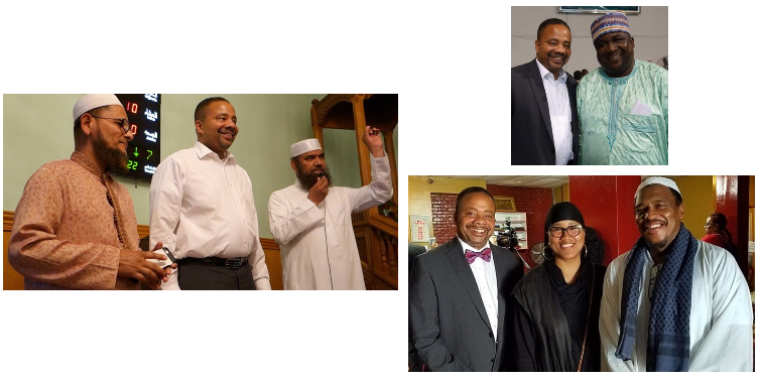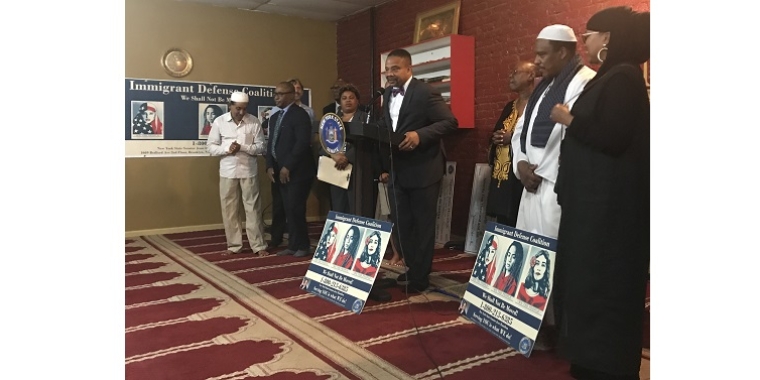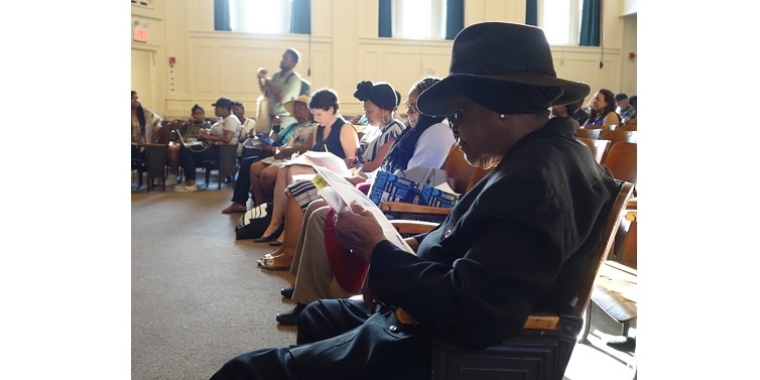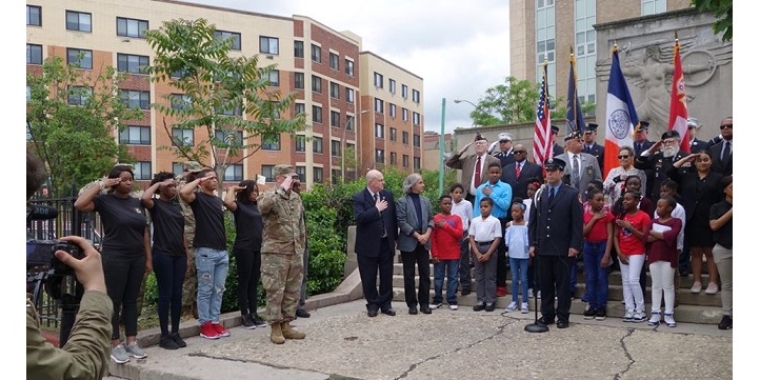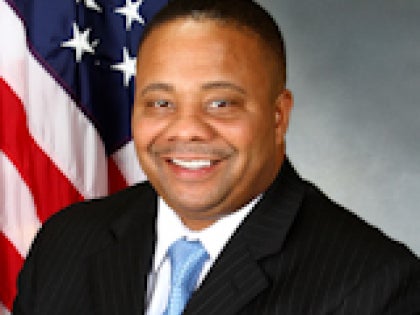
NYS Senator Jesse Hamilton & Assemblywoman Diana Richardson Unite with Broad Coalition for Black History in NYC Schools Bill
Ean Fullerton
May 11, 2017

Brooklyn, NY – NYS Senator Jesse Hamilton and Assemblywoman Diana Richardson today united with colleagues, educators, and community advocates in favor of legislation requiring the Board of Regents incorporate New York State’s black history in NYC schools curricula. At the Weeksville Heritage Center in Brooklyn, the group expressed support for S. 5454, a bill aiming to incorporate New York State’s black history in New York City schools’ curricula for K-12 students.
NYS Senator Jesse Hamilton said, “Black history’s importance extends far beyond a single month, and New Yorkers have made profound contributions that need to be taught in our schools. From the women abolitionists, who broke barriers in advocacy and helped end slavery, to the Harlem Renaissance, whose literary and artistic dynamism we benefit from even today, to the pioneering achievements of Shirley Chisholm, who paved a path for future public servants of color, men and women alike, New York has an important history our young people should engage with. Serving as part of our collective, national heritage, we need to uplift this history and teach it in New York City Schools.”
“The significance and humanity of African American history is often treated with blatant indifference, but through the implementation of this history into the curriculum of our schools, the undeniable contributions women and men of color have made towards society, can help strengthen understanding and awareness,” said Assemblywoman Diana C. Richardson.
NYS Senator Marisol Alcantara said, “Black history in New York is an integral part of New York State history and should be taught as such. From early free black communities like Weeksville, Brooklyn, to the publication of Frederick Douglass’ North Star from his home in Rochester, New York State has borne witness to the tragedies and triumphs of the African-American experience. As an Afro-Latina woman, I fully stand behind this effort to rediscover and highlight the contributions and trials of black New Yorkers, which in many cases have been deliberately underemphasized or even erased by traditional historians.”
“The African Diaspora has played a tremendous role in the advancement of modern society, but our contributions as a people have been omitted from our classrooms. History has a profound effect on who we are as individuals; and it is so critical for young people of color to understand that their identity as a people goes far beyond the negative imagery that they see every day. They deserve the opportunity to know that they are the descendants of leaders, innovators, and trailblazers whose ideas and inventions remain an impactful part of this nation’s legacy. I applaud our state legislators for spearheading this effort to integrate Black history into the curriculum of all schools – ultimately ensuring that our sacrifices are never forgotten,” said Council Member Laurie A. Cumbo.
Bertha Lewis, President of The Black Institute, said, “As noted by George Santayana, those who cannot remember the past are condemned to repeat it. Given that racial minorities comprise at least 60% of our city population and with over 1 million Black and Brown kids at our city schools, it is unconscionable that Black history, which is American history, is not being taught in schools as part of the American history (curriculum). This situation must be changed immediately, for the benefit of all school students.”
Dr. Rudolph F. “Rudy” Crew, President of Medgar Evers College, said, “It is an understatement to say that without the labor, spirituality, intellect, and unfettered artistry of African-Americans this country would not exist. The African-American story informs U.S. history to a remarkable degree. “Black History,” is an inextricable part of all of our histories and it should be taught in all our schools.”
Professor Victoria Chevalier, Medgar Evers College, African American Studies Department, said, “This means that our children will come to understand and honor their experiences and their world as a reflection of what really is a complex history. Let’s face it: NY would not exist as we know it without black history. The wall on Wall Street would not exist without black history. The transatlantic railroad would not exist without black history. Inventions in medicine would not exist without black history, advancements in science would not exist without black history, the mighty Atlantic Ocean would not exist as we know it without black history, the World Bank would not exist without black history, and the globe would not exist without black history. It is high time we honor these facts by institutionalizing their inclusion in the NYC curriculum.”
Stephanie Wilchfort, President of the Brooklyn Children's Museum, said “As a neighborhood anchor and the home of first cultural experiences for children in Brooklyn, Brooklyn Children’s Museum proudly supports the initiative to incorporate Black history in New York City school curricula. Home to one of the first free African American communities in the United States, our Crown Heights neighborhood has been a center of Black culture for nearly two centuries. The stories of our community are some of America’s most important stories, and their inclusion will help all children more fully understand and explore the history of our City and our country.”
Rev. Kevin McCall, National Crisis Director of the National Action Network, said, “Nelson Mandela said, ‘Education is the most powerful weapon which you can use to change the world.’ The Black History bill will create change and confidence in our youth by providing role models outside of sports and entertainment. I commend Senator Hamilton and Assemblywoman Richardson."
Lee Soulja-Simmons, Executive Director of NYC Black Pride said, "African Americans and LGBTQ people of color are a big part of the story of America. We have made significant contributions to the fabric and quality of life of all people both here and abroad. Including African American history into our public school curriculum, would go a long way to fighting racism and moving forward more equality. It would also help to increase self-esteem in young minorities and foster increased acceptance of the true diversity of the citizens of the United States."
Angela M. Williams, President of Delta Sigma Theta Sorority, Inc. East Kings County Alumnae Chapter, said "The East Kings County Alumnae Chapter of Delta Sigma Theta Sorority, Incorporated actively delivers volunteer public service in the eastern section of the borough of Brooklyn in New York City. Our National Five-Point Programmatic Thrust includes Educational Development. As educators, parents and concerned New York City citizens we believe educational curricula should be inclusive of the historical experiences and contributions of Black Americans. We support New York State Senate bill S.5454 to amend the New York State Education Law by adding a new section 801-b to require a component of instruction in Black History for New York City's school children in grades Kindergarten to 12."
Jacob Morris, Board Member of the NYC Freedom Trail, said, "In 2005 our State passed legislation establishing an Amistad Commission modeled on New Jersey's successful implementation of its own Amistad Commission. Its mission simply stated, is to infuse our State’s Curriculum with knowledge of the great contributions of African-Americans and other historically under acknowledged groups to our shared American and New York History. It has been 12 Years since our own Amistad Commission was established but it has not lived up to its potential. We are dedicated to remedy this lack in our State’s Curriculum. We demand a functioning Amistad Commission. We will also continue to seek ways to constructively amend and restructure our existing Amistad Commission so that it can fulfill the great mission that our state mandated."
Shawné Lee, Director of Friends of 227 Abolitionist Place and daughter of Joy “Mama Joy” Chatel, said, “My family has been fighting for over a decade to preserve and celebrate Brooklyn’s Abolitionist and Underground Railroad history. This is an essential part of New York’s story, but why should it be left to our small nonprofit to do this? The Amistad Commission was supposed to take the lead, but it has been invisible. Many schools in Brooklyn are largely African-American, and how can we expect these children to live up to their potential when they do not see the achievements of others who look like them? Many dedicated teachers love our history and work to teach it, but this if NOT ENOUGH. Why do these teachers have to do the state’s job to develop a curriculum that honors our African-American history? I call on New York State to do its job: We must educate our children about the full story of New York.”
A crossroads for the world, New York’s black history intersects with experiences of the Afro-Caribbean community, the Afro-Latino community, and the entire African diaspora. Under the provisions of this proposal, the Board of Regents will be responsible for determining how black history is incorporated.
About Weeksville Heritage Center:
Weeksville Heritage Center, Brooklyn’s largest African-American cultural institution, is a multidisciplinary museum dedicated to preserving the history of the 19th century African American community of Weeksville, Brooklyn - one of America’s first free black communities. Using a contemporary lens, we activate this unique history through the presentation of innovative, vanguard and experimental programs. Weeksville advances its mission through history, preservation, visual and performing arts, ecology and the built environment.
About Senator Hamilton:
Senator Jesse Hamilton has spent his entire career helping people, including over 15 years as President of the School Board and District Leader. He is a husband, father, and public servant delivering and fighting for one of the most diverse Senate districts in New York State.
###
